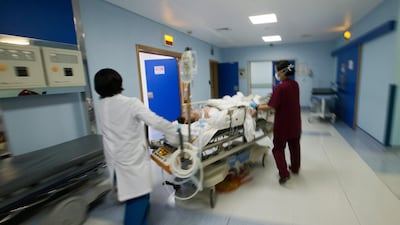Doctors are faced with the dilemma of choosing between under-treating vulnerable cancer patients or potentially exposing them to Covid-19.
As the number of confirmed coronavirus cases continue to rise in the UAE, an Emirati oncologist said “limited, but accumulating evidence” suggested that cancer patients were at a higher risk of infection.
Increased hospital exposure, advanced age and low immunity resulting from treatment, such as radiotherapy and targeted therapy, made them more vulnerable to the virus.
While global health authorities have advised that all essential cancer care should continue, some doctors have had to discuss treatment delays with individuals.
According to a research paper, A practical approach to the management of cancer patients during the Covid‐19 pandemic, cancer specialists suggest that postponing "elective surgery or chemotherapy" for patients with low risk disease progression should be considered on a case-by-case basis.
"In this review, we addressed some of the current challenges associated with managing cancer patients during the Covid-19 crises and provided some guidance and recommendations," Dr Humaid Al Shamsi, a consultant oncologist at Al Zahra Hospital in Dubai told The National.
“During a pandemic, the consent process [between patient and doctor] may change as the risk and benefit ratio may alter.
“Patients may face difficulties, including access to hospitalisation and deferred surgeries.
“[They] also need to know that anti-cancer therapy could carry greater risk during a pandemic.”
The research was published in The Oncologist medical journal earlier this month.
Dr Al Shamsi co-authored the paper in collaboration with medical expert bodies in six countries including China, Singapore and the US.
As part of the research, he conducted a pilot study in Dubai and screened 85 asymptomatic patients with cancer during their workup and cancer treatment.
The results detected seven patients, or 8 per cent, with Covid-19 infection.
Since the outbreak, people fighting cancer have expressed concern about the treatment choices they need to make.
Dr Al Shamsi, who is also president of the Emirates Oncology Society, said individuals undergoing cancer treatment often have compromised immunities.
As a result, they were “more susceptible to acquiring infections” and it was less likely their bodies would be able to fight them.
In a normal setting, many cancer patients frequently visit the hospital for treatment and disease surveillance.
However, minimising outpatients’ visits and admissions could help mitigate exposure and possible further transmission, he said.

With the guidance of a consultant, patients could also be encouraged to make an “informed choice” about opting for less invasive treatment.
“Delaying elective surgical intervention may be more appropriate for select patients,” said Dr Al Shamsi.
“For example, early asymptomatic small breast cancer tumours detected on routine screening mammograms could be monitored closely until the pandemic is more controlled or over.”
According to their findings, he said 60 day delays in surgical intervention in early stage breast cancer was not associated with “worse oncological outcomes”.
However, one of the challenges in delaying elective surgery is the uncertainty regarding the end date of the pandemic.
In Dubai, he said there had been “many cases” of patients postponing or readjusting treatment plans.
“During a follow up evaluation, a patient recently diagnosed with breast cancer presented with a fever and her Covid-19 test came back positive,” he said.
“We have had to delay her treatment and now we are waiting for her to be cleared by a negative test to be able to resume her path to recovery.”
The coronavirus epidemic has put a huge strain on healthcare resources too, he said.
And that has had an impact on treatment planning for certain cancer diagnoses.
“Globally, access to hospital beds has been limited due to increased patient demand and potential staff shortages,” he said.
“In the UAE, cancer patients are being isolated from hospitals that have Covid-19 cases as they run a higher risk of infection if exposed to the virus.
“It is important for people with cancer and their family members to take steps to protect themselves, especially when it comes to frequent hand-washing.
“We recommend that you speak with your oncologist if you have concerns about your current immunity level as a result of current or previous cancer treatment.”


